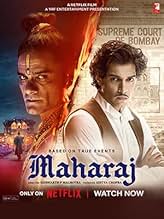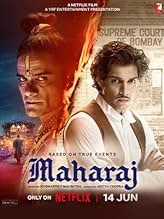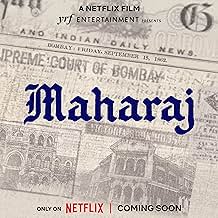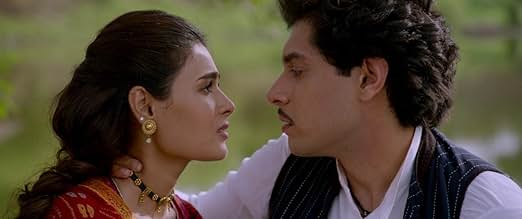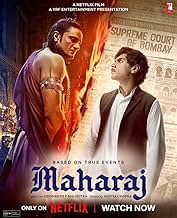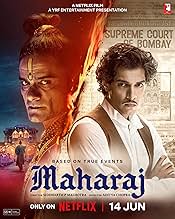VALUTAZIONE IMDb
6,5/10
15.260
LA TUA VALUTAZIONE
Basato su un caso giudiziario storico della vita reale, un audace giornalista mette in dubbio il comportamento immorale di un rispettato leader.Basato su un caso giudiziario storico della vita reale, un audace giornalista mette in dubbio il comportamento immorale di un rispettato leader.Basato su un caso giudiziario storico della vita reale, un audace giornalista mette in dubbio il comportamento immorale di un rispettato leader.
- Regia
- Sceneggiatura
- Star
- Premi
- 11 vittorie e 28 candidature totali
Riepilogo
Reviewers say 'Maharaj' is a historical drama tackling blind faith and social reform, lauded for its narrative and performances. Junaid Khan's debut and Jaideep Ahlawat's antagonist role are highlighted, though opinions on Khan's performance differ. The film's production, cinematography, and historical context are praised, yet some criticize the screenplay and pacing. It's seen as a resonant, thought-provoking piece on truth and justice.
Recensioni in evidenza
"Maharaj," directed by Siddarth P. Anand, is a compelling historical drama that revisits the landmark Maharaj Libel Case of 1862. With an engrossing storyline, powerful performances, and meticulous attention to historical detail, the film offers a vivid portrayal of a pivotal moment in Indian legal history and society.
Plot Summary The film centers on the Maharaj Libel Case, a significant legal battle in Bombay during the British Raj. The case involves a young journalist, played by Junaid Khan, who exposes the immoral activities of a powerful religious leader from the Vaishnav sect, portrayed by Jaideep Ahlawat. The resulting defamation lawsuit becomes a landmark case, highlighting the clash between truth and power, and the fight for justice and moral integrity.
Acting Performances Junaid Khan delivers a breakout performance as the courageous journalist. His portrayal of a principled young man standing up against corruption and hypocrisy is both compelling and inspiring. Khan's nuanced acting captures the internal struggles and resilience of his character, making his journey profoundly relatable.
Jaideep Ahlawat is equally formidable as the antagonist. His depiction of the charismatic yet morally corrupt Maharaj is chilling. Ahlawat's ability to convey the complexities of a powerful figure facing public scrutiny adds significant depth to the narrative. His performance ensures that the character is not just a one-dimensional villain, but a person with his own vulnerabilities and manipulations.
Direction and Cinematography Siddarth P. Anand's direction is masterful, showcasing his talent for creating a rich, immersive historical setting. His eye for detail is evident in the meticulous recreation of 1860s Bombay, bringing to life the bustling streets, colonial architecture, and socio-political atmosphere of the era. Anand's ability to balance the dramatic courtroom scenes with the broader social context of the time is commendable, making the narrative both gripping and educational.
Historical and Cultural Context The film delves deep into the Vaishnav sect, exploring its beliefs, practices, and the influence of its leaders during the British Raj. Anand presents a balanced view of the sect, highlighting its spiritual significance while also critiquing the corruption that can arise within any institution. This contextual richness adds layers to the story, making it not just a legal drama, but a commentary on the complexities of faith and power.
Set Design and Production Values The set design in "Maharaj" is outstanding, capturing the essence of 19th-century Bombay with impressive authenticity. The attention to detail in the costumes, props, and settings creates a visually captivating experience. The production team's dedication to historical accuracy extends to every aspect of the film, from the grand courtrooms to the modest homes and bustling marketplaces. This meticulous craftsmanship immerses the audience in the period, enhancing the storytelling.
Conclusion "Maharaj" is a powerful and thought-provoking film that excels in both storytelling and historical representation. The performances of Junaid Khan and Jaideep Ahlawat are stellar, bringing depth and intensity to their characters. Siddarth P. Anand's direction ensures that the film is not only a compelling legal drama but also a rich historical tapestry that sheds light on an important chapter in Indian history.
With its engaging narrative, strong performances, and impeccable production values, "Maharaj" stands out as a significant contribution to contemporary Indian cinema. It is a film that challenges, inspires, and transports the audience to a crucial moment in time, reminding us of the enduring struggle for truth and justice.
Plot Summary The film centers on the Maharaj Libel Case, a significant legal battle in Bombay during the British Raj. The case involves a young journalist, played by Junaid Khan, who exposes the immoral activities of a powerful religious leader from the Vaishnav sect, portrayed by Jaideep Ahlawat. The resulting defamation lawsuit becomes a landmark case, highlighting the clash between truth and power, and the fight for justice and moral integrity.
Acting Performances Junaid Khan delivers a breakout performance as the courageous journalist. His portrayal of a principled young man standing up against corruption and hypocrisy is both compelling and inspiring. Khan's nuanced acting captures the internal struggles and resilience of his character, making his journey profoundly relatable.
Jaideep Ahlawat is equally formidable as the antagonist. His depiction of the charismatic yet morally corrupt Maharaj is chilling. Ahlawat's ability to convey the complexities of a powerful figure facing public scrutiny adds significant depth to the narrative. His performance ensures that the character is not just a one-dimensional villain, but a person with his own vulnerabilities and manipulations.
Direction and Cinematography Siddarth P. Anand's direction is masterful, showcasing his talent for creating a rich, immersive historical setting. His eye for detail is evident in the meticulous recreation of 1860s Bombay, bringing to life the bustling streets, colonial architecture, and socio-political atmosphere of the era. Anand's ability to balance the dramatic courtroom scenes with the broader social context of the time is commendable, making the narrative both gripping and educational.
Historical and Cultural Context The film delves deep into the Vaishnav sect, exploring its beliefs, practices, and the influence of its leaders during the British Raj. Anand presents a balanced view of the sect, highlighting its spiritual significance while also critiquing the corruption that can arise within any institution. This contextual richness adds layers to the story, making it not just a legal drama, but a commentary on the complexities of faith and power.
Set Design and Production Values The set design in "Maharaj" is outstanding, capturing the essence of 19th-century Bombay with impressive authenticity. The attention to detail in the costumes, props, and settings creates a visually captivating experience. The production team's dedication to historical accuracy extends to every aspect of the film, from the grand courtrooms to the modest homes and bustling marketplaces. This meticulous craftsmanship immerses the audience in the period, enhancing the storytelling.
Conclusion "Maharaj" is a powerful and thought-provoking film that excels in both storytelling and historical representation. The performances of Junaid Khan and Jaideep Ahlawat are stellar, bringing depth and intensity to their characters. Siddarth P. Anand's direction ensures that the film is not only a compelling legal drama but also a rich historical tapestry that sheds light on an important chapter in Indian history.
With its engaging narrative, strong performances, and impeccable production values, "Maharaj" stands out as a significant contribution to contemporary Indian cinema. It is a film that challenges, inspires, and transports the audience to a crucial moment in time, reminding us of the enduring struggle for truth and justice.
The movie is based on an objectionable illicit and old social practice by religious leaders in British India and a social reformer's fight against it. The antagonist is a veteran actor who did his part splendidly, the protagonist is a debut actor who did a good job considering its his debut, but there's certainly scope for him to polish his skills. The actress and side actors were good at their parts as well. The movie seemed a little too "bollywoody" at times, but quickly comes back on track. I don't think the movie did a good job at convincing us that the movie is set in 19th century India because at times the behaviour of the characters amongst each other made it lack authenticity. Overall, the movie is a good one-time watch.
I wasn't expecting much from the movie but thought of giving it a watch and honestly it ended up exceeding my expectations. From the cinematography to the dialogues everything was exceptional. Also I found junaid khan's performance so natural and impressive since this was his debut movie and he absolutely nailed it!! Hope that he gets to play more amazing roles in future as he seems like the only nepo kid who's trying to make his name by his hard work and not through PR. Sharvari was a treat to watch as well.
This movie not only shows the illicit acts that people used to practice under the guise of religion but also highlights the issues women face to this day. Recommended!
This movie not only shows the illicit acts that people used to practice under the guise of religion but also highlights the issues women face to this day. Recommended!
I watched the movie 'Maharaj', it talks about a very old ritual called "Charan Seva" which is actually very unhuman and we are surprised to know that ritual still exists in different ways.
When some rituals who made by human become religion then majority of devotees accept and follow. Its very difficult to raise our voice against that types of unhuman activities.
How simple man named 'Karsan Dass' raised his voice against?
How to expose and deal with very old unhumnan ritual when all accepted already?
How to hold self believe when every one against with him?
This type of movie we require because some bad rituals still exists in every religion. So don't think that is only one religion problem.
All the department of movie like story, screenplay, Direction, acting are decent and yes because this is first movie of Amir Khan's son Junaid Khan so people's special eyes on this movie too.
When some rituals who made by human become religion then majority of devotees accept and follow. Its very difficult to raise our voice against that types of unhuman activities.
How simple man named 'Karsan Dass' raised his voice against?
How to expose and deal with very old unhumnan ritual when all accepted already?
How to hold self believe when every one against with him?
This type of movie we require because some bad rituals still exists in every religion. So don't think that is only one religion problem.
All the department of movie like story, screenplay, Direction, acting are decent and yes because this is first movie of Amir Khan's son Junaid Khan so people's special eyes on this movie too.
Any who crosses the dignity n sanctity of Vedic injunctions for ulterior selfish motives misusing n misguiding needs to be taught a lesson. That's the theme of the movie. Story revolves around a true historical court case of 1862 in Bombay portraying the fight between a self claimed saint n a social reformer. A socially highly relevant film with an amazing sets, cast n execution. Storytelling has been powerful. Definitely worth a watch. Available on Netflix. My ratings 7/10!
Any who crosses the dignity n sanctity of Vedic injunctions for ulterior selfish motives misusing n misguiding needs to be taught a lesson. That's the theme of the movie. Story revolves around a true historical court case of 1862 in Bombay portraying the fight between a self claimed saint n a social reformer. A socially highly relevant film with an amazing sets, cast n execution. Storytelling has been powerful. Definitely worth a watch. Available on Netflix. My ratings 7/10!
Any who crosses the dignity n sanctity of Vedic injunctions for ulterior selfish motives misusing n misguiding needs to be taught a lesson. That's the theme of the movie. Story revolves around a true historical court case of 1862 in Bombay portraying the fight between a self claimed saint n a social reformer. A socially highly relevant film with an amazing sets, cast n execution. Storytelling has been powerful. Definitely worth a watch. Available on Netflix. My ratings 7/10!
Lo sapevi?
- QuizDebut of Junaid Khan.
I più visti
Accedi per valutare e creare un elenco di titoli salvati per ottenere consigli personalizzati
- How long is Maharaj?Powered by Alexa
Dettagli
- Tempo di esecuzione2 ore 11 minuti
- Colore
- Mix di suoni
Contribuisci a questa pagina
Suggerisci una modifica o aggiungi i contenuti mancanti



